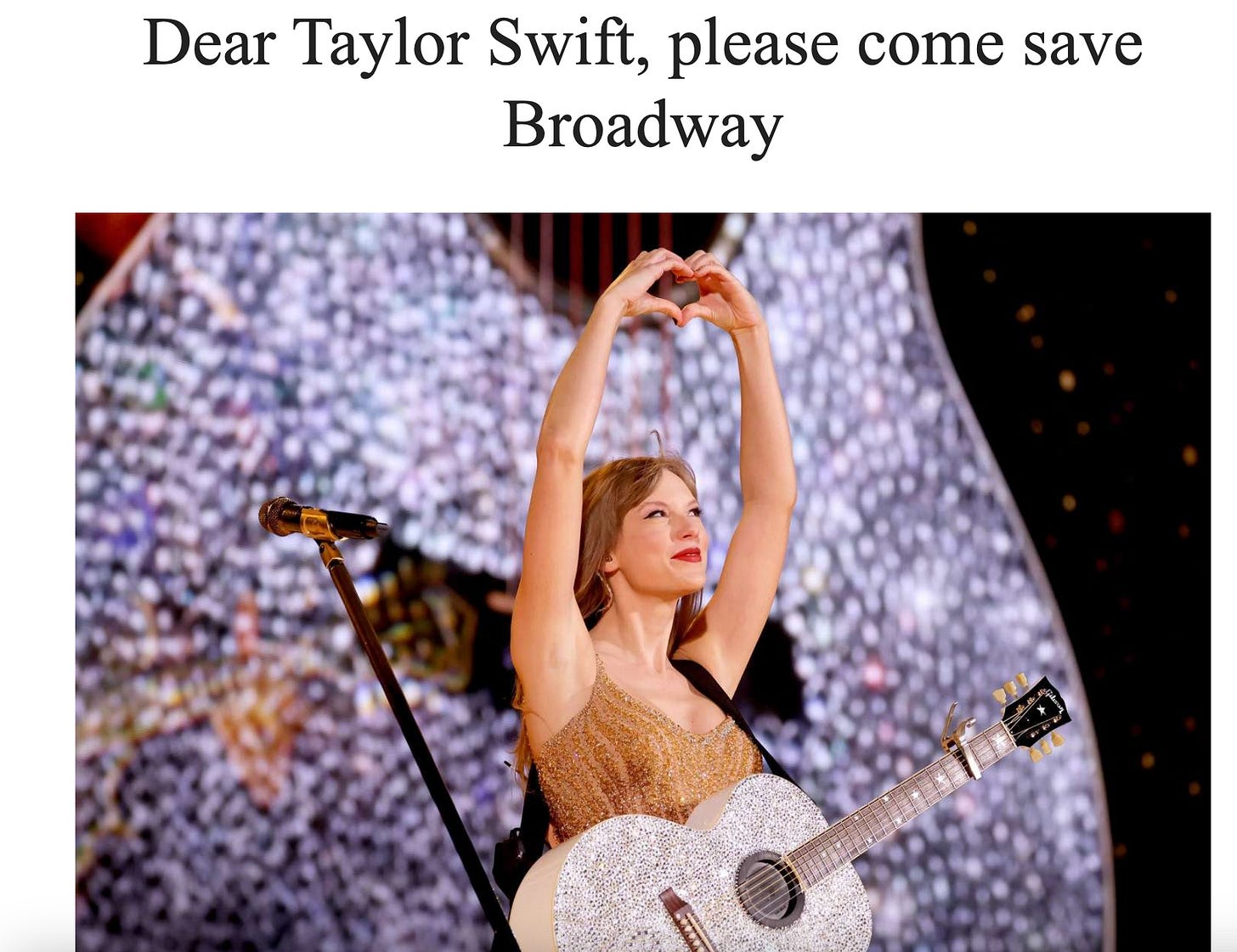i wanted to respond to this piece from OnstageBlog.
“Shows that reshape the musical landscape? We’ve had those. They won awards, most them closed right after the Tonys. Lowering ticket prices? That solves nothing,” OnstageBlog writes. “While Broadway has had some hits over the past decade and certainly has seen some incredible shows that have pushed what musical theatre can be (A Strange Loop and Hadestown among them), what the industry needs now more than ever is a show that lifts the entire industry financially and socially. In a time when Broadway needs a hero, Taylor Swift could be the industry’s saving grace.”
nowhere does this piece consider what a Taylor Swift musical could look like, artistically (that is something i could be interested in talking about)! i am so tired of fandom that is secretly capitalism. fandom can be transformative, life-saving, community-building — i have written a play about teenage girls running their fandom like it’s the mob, literally. but fandom that is secretly capitalism turns individuals into collaborators.
capitalism and commercial producers have flattened Broadway Theatre down to its relationship to profit, and the bastardization of fandom has helped usher that process along. to be a fan of a specific show is to patronize it, as many times as you can; it’s to spend as much money as possible on tickets and merch so you, personally, can do your part to keep your favorite show alive; it’s to come down on critics because well-paid theatre jobs are so scarce, it’s almost sacrilegious to suggest a show lacks artistic merit. don’t you know you’re putting artists out of a job by criticizing them?
what we’re all really upset about is an arts ecosystem that necessitates such individual investment. we do not have a state theatre, the NEA shrinks ever-smaller. anyone who’s been paid to act or stage manage can join Actors’ Equity now, which is a good start on the road to more-universally-available health benefits for theatre workers, but only for actors and stage managers. innovative work opens and closes so we can continue to support sure money-makers and keep the industry employed. more than we need sure money-makers and positive reviews, we need universal healthcare, universal basic income, and public arts subsidies. we need to take art and artists seriously, and acknowledge that the success of a piece cannot be measured in box office receipts. we need a complete overhaul of the system that’s made it possible for the theatre community to splinter so far in disparate directions, laying bare who is here for love and who is here to be seen spending money.
i think this kind of flattened-love happens across all kinds of fandom — sports! music! tv! film! but engagement and love of a thing has to be about more than the numbers you spend or the numbers the thing you love produces. we are all subjects of a capitalist experiment that has lied to us about personal responsibility for 250 years, that has led us to believe freedom means freedom of spending and our freedom of spending is what makes the economy run on time. art deserves to be loved better — meaning it is seen and criticized and talked about, meaning it’s made by people and not corporations or computers, meaning its impact can be divorced from the amount of money it makes. i don’t have the tools or the economic history to tell you how to make this happen — i just know that Taylor Swift’s money is not the answer.
i have COVID and i’m taking time off from my part-time job, which is currently where i’m making all of my money :( i’m running a scheme where if you venmo me $5, i will write you a haiku; if you venmo me $10, i will write you a limerick; if you venmo me $20, i will write you a sonnet! on the topics of your choice, of course! my venmo is @Sarah-Leiber!
ALSO i think a Taylor Swift musical could be good… she often has a great sense of character and storytelling… but let me know what you think it could be like in the replies.






I think Illinoise and American Idiot are useful models for what an actually-good TS musical could be. Would her fans want that, though? My feeling is that there’s an unresolvable tension between what would be interesting innovative theater, and what would be a mass-audience commercial hit.
Feel better!